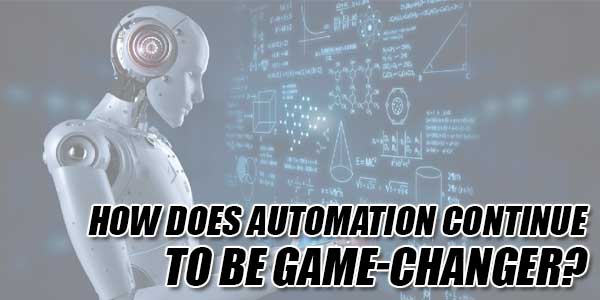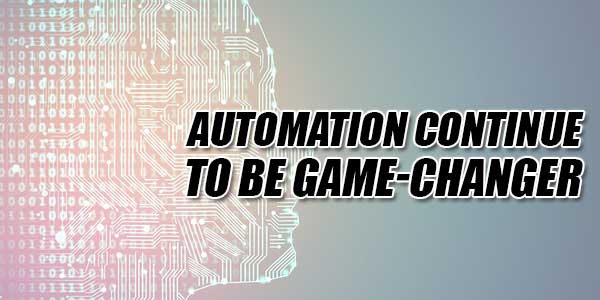
As the title described automation is the game-changer which means that most of the IT industries depend on automation. Without automation, the efficiency may decrease which leads to the increase of human errors and also causes lack of proper ability. As the world expecting more and more it is the time for IT-professionals to produce more quality products with few resources. By leveraging everything with automation then the entire network will run very smoothly and it helps the other team members to concentrate on other important tasks that are cannot be automated.
In order to have a secured system then the implementation of brilliant automation can give the ideal balance by considering human points. What is meant by human errors? As we know that human beings are not as perfect as a machine. There is a chance of errors when human do any task but, in the case of machines, it is very less. In the traditional IT operations when an error occurs, a notification will receive by the team and an immediate appropriate action taken to resolve that issue. At this phase, the IT automation gives the opportunity for the IT personnel to correct the problem. This helps to improve system availability.
Table of Contents
The Significance Of IT-Automation:
Historically, IT industries do one thing at a time and thereafter moved to another thing. It was done because to avoid the confusion and to operate the system operations very smoothly. By that time there were many manual and repetitive tasks. During that period IT automation came into the picture to do the repetitive tasks. At present, the IT automation is in a place it can improve the organization with its strategies however it is operated by the human.
IT automation is not enough to solve all the complexities and problems. It means all the automation products are not created equally. The decisions should be based on the needs and also on the ability of integration. On the other hand, we have IT process automation which can be used for the network, application and system tasks. The Run book automation cover all repetitive works of IT personnel.
Transforming Into Intelligent Automation:
Now we are in the era of cognitive computing in which artificial intelligence, machine learning and robotic process automation(RPA) play an important role. Organizations can create their own software robots that are enabled by RPA to automate the process of organization and these bots are non-invasive, non-disruptive which leads to the creation of smarter business processes through the perfect repetitive tasks performed at the labour cost reduction of 25-40 percentage.
However, there are few more sophisticated technologies like machine learning, artificial intelligence, cognitive automation and computer vision. When these technologies collaborate with RPA can give the capabilities of augmented automation to amplify the value of the business and also the organizations’ competitive advantages.
Today, every organization aware of increasing RPA execution capabilities combined with machine learning can help them to reach the next level. In RPA the software robots should provide a set of instructions as they are not intuitive in nature but they have the capability to execute the defined tasks. Whereas artificial intelligence is used to carry smart tasks and also some of the human capabilities like reasoning and cognition. Machine learning is a process that provides machines and applies artificial intelligence to them. The main advantage of AI algorithm is the adaptability in a new environment and to learn from outcomes through the decisions.

The Goal Of Automation:
There are a lot of goals, such as reducing mistakes, getting quality output from the existing resources, and improving safety. Some IT-professionals think that productivity is the only goal. Of course, it is correct to some extent. But the hardcore fact is that productivity is not only the goal. Still, many of the companies are worrying about productivity and about maximizing profits. At the present situations, the most common goal is to reduce the labour power and its cost then it leads to an increase in profits. This is how every business manager analyse.
Customers’ Benefits Through Automation:
Whoever the customer is, whatever the product he wants from the automation he expects the following benefits.
- Immediate response when a problem arises
- Timely follow up
- Personalization
- Forecasting the needs and requirements
The objectives may vary in every industry but, the ultimate thing is to get the customer’s loyalty. Business managers and leaders should look at themselves first whether the automation reflects in a better way or not to have better services and products. The customer doesn’t care about the company even it is innovative or not but, he only cares about the better outsources.
The Future Of IT-Internal Controls:
For many shareholders, companies, and regulators the internal controls place a key role. The costs of compliance increasing day by day in organizations. Risk management, operational management, and controllership/compliance function are the three defence lines for managing internal controls. Apart from these defence lines, multifarious questions are one of the challenges faced by senior management. The centre of excellence in IT controls always helps in managing the internal controls and hence it is termed as the “Defence central line.”
Intelligent Automation in HR Functions:
The intelligent automation has the capability in transforming human resources (HR). The HR function is to make transitions from the “cost centre” to a “profit centre” for the business. Machine learning, artificial intelligence, and intelligent automation play an important role in bringing that possibility in human resource. Whereas artificial intelligence and machine learning have been argued in HR, but intelligent automation remains as a strong entity for HR.
What Is Intelligent Automation?
Intelligent automation combines artificial intelligence (AI) with automation in order to make the machines to understand, sense or learns with human assistance. Unlike the robotic process automation, IA permits the machines to normal activity as well as making intelligent decisions. Intelligent automation can have the capability of understanding the processes. It has the potential in boosting efficiency, fostering innovation and improving the productivity of HR function. It helps in making smarter decisions and getting quality output with less time consumption. The repeated tasks can also be done by using the IA which leads to the HR in saving the time and focus on people activities such as employee management, salaries concern etc..
Implementing IA In HR:
Nowadays, the impact of intelligent automation cannot be understandable for many business leaders. Undoubtedly, IA has a huge impact on driving efficiencies and cutting costs. Many of the people are struggling to define clear objectives and goals for intelligent automation accountability and deployment. Despite all these advantages, business leaders struggling with it for employees. IA has great potential on satisfying the employees because of the huge impact that it has on society and it has several benefits beyond time reduction and cost.
Increase Business Efficiency Through Automation:
Functions like Information & Technology(IT), finance and human resources mostly depend on operating procedures such as data entry, information routing processes, and human interaction. These repetitive works can be automated by then a big change happens in that workplace. In some other processes like HR services and ticketing for IT departments, the automation is growing slowly. Enterprises need integrated systems by using their existing infrastructures and also automate the logics with the existing workflow. In the coming decades, automation plays a major role in increasing global productivity. In the year 2016, one of the consulting firms reports that 0.8 percentage of raise happens in global productivity through automation and predicts that figure may rise to 1.4 percentage in 2050.
Conclusion:
Over the last decade, the manual process is getting down because of the automation by then human errors were decreased. Company’s revenue may also get increased with productive work of automation. Nowadays companies are using various operation without any important interventions from humans. Using automation by way of artificial intelligence and machine learning is the biggest game-changers.

 About the Author:
About the Author:












Be the first to write a comment.